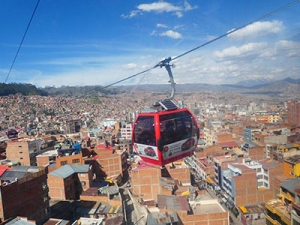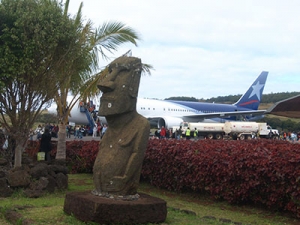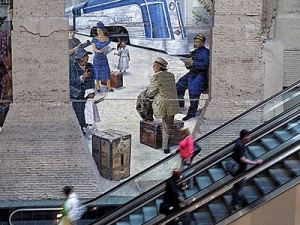 Since you are reading this on a travel related website you are almost certainly a hardened traveller! Optimistic, always looking for new places to visit and you enjoy reminiscing with fellow travellers about previous journeys.
Since you are reading this on a travel related website you are almost certainly a hardened traveller! Optimistic, always looking for new places to visit and you enjoy reminiscing with fellow travellers about previous journeys.
The still unravelling consequences of Covid on air travel may have been a bit of a shock. Most people I know are now continually extending the time horizon when they anticipate a return to the new normal. Some are also trying to figure why their airline/travel agent won’t refund their money but will only offer a voucher… ho hum.
There aren’t too many reasons to be cheerful at present, but it would be a shame not to plan future travel even if you’re not sure who will be flying you, where or when! That said the era of border controls, health checks and self-isolation combined with the inconsistencies between individual sovereign states currently makes choosing a route and destination very tricky.
The lowdown on the lockdown
 IATA’s Director General and CEO Alexandre de Juniac noted “Governments will depend on aviation to be ready to lead an economic recovery when this pandemic is behind us. Governments must act now with financial lifelines that only they can provide for airlines and airports to see them through these extraordinary times. Airlines and airports are in this together. The more financially stable our airport partners are, the more they can help the industry to drive a recovery in air travel that will jump start the global economy.” April 30.
IATA’s Director General and CEO Alexandre de Juniac noted “Governments will depend on aviation to be ready to lead an economic recovery when this pandemic is behind us. Governments must act now with financial lifelines that only they can provide for airlines and airports to see them through these extraordinary times. Airlines and airports are in this together. The more financially stable our airport partners are, the more they can help the industry to drive a recovery in air travel that will jump start the global economy.” April 30.
We should also remember the significant role airlines play as freight carriers with pharmaceutical supplies at particular risk if freight capacity shrinks. “IAG’s airlines have been helping to repatriate customers throughout the world and to conduct cargo flights delivering vital medical equipment and supplies, food and other products to combat COVID-19 and keep global supply chains moving”.
How many airlines will survive the cut?
Globally, commercial air traffic shrunk 41 per cent below 2019 levels in the last two weeks of March alone, according to Flightradar24. It is said that two thirds of the world’s airline fleet are grounded – which is almost certainly a low estimate.
Clearly any airline will be under pressure at the present time. However, some are owned by Governments with limitless pockets whilst others have been at risk for some time. Major legacy carriers and budget airlines such as British Airways, Ryanair, Lufthansa Group and many more are developing and/or announcing staff redundancies and fleet reductions. Others are no doubt about to outlining their plans for downsizing to respond to the collapse of traffic. This inevitably will have an impact on the entire airline sector from Airbus, Boeing and Rolls Royce to a huge range of secondary suppliers.
Since the seats at the front of the plane make most of the money another factor will be the ways in which the corporate sector responds to the need to cut costs. This and the era of Zoom and remote working make it very likely that demand for business travel will drop significantly.
 Alexandre de Juniac, the director general of the International Air Transport Association (Iata), said that if governments ordered airlines to adopt physical distancing onboard aircraft, at least a third of seats would remain empty and airlines would have to raise their ticket prices by at least 50% or go bust.
Alexandre de Juniac, the director general of the International Air Transport Association (Iata), said that if governments ordered airlines to adopt physical distancing onboard aircraft, at least a third of seats would remain empty and airlines would have to raise their ticket prices by at least 50% or go bust.
“Either you fly at the same price, selling the ticket at the same average price as before, and you lose enormous amounts of money so it’s impossible to fly for any airline, particularly low cost; or you increase ticket prices by at least 50% and you are able to fly with a minimum profit. So, it means that if social distancing is imposed, cheap travel is over.”
There is an irony here, since in the era of densification many airlines reduced pitch and seat width and added extra seats to earn extra dollars! Austrian Airlines are projecting are predicting a return to the skies in a few months “but we want to avoid empty flights at all costs. We will only take off when a new start makes sense for Austrian…and when the ease of travel restrictions makes this possible…not expecting passenger numbers at 2019 level until 2023.
How will airports and passengers cope with new policies and restrictions?
 My favourite airport HKG is doing its bit to cope and control the environment, we passengers will – for some time – have to cope with. The Airport Authority says HKG is “the world’s first airport where “CLeanTech”, a full-body disinfection channel facility, is trialled in live operation. Persons using the facility will have a temperature check before entering an enclosed channel for the 40-second disinfection and sanitizing procedures. The channel is kept under negative pressure to prevent cross-contamination between the outside and inside environment. Currently, the facility is designated for use by staff who take part in public health and quarantine duties at the airport in relation to arriving passengers.”
My favourite airport HKG is doing its bit to cope and control the environment, we passengers will – for some time – have to cope with. The Airport Authority says HKG is “the world’s first airport where “CLeanTech”, a full-body disinfection channel facility, is trialled in live operation. Persons using the facility will have a temperature check before entering an enclosed channel for the 40-second disinfection and sanitizing procedures. The channel is kept under negative pressure to prevent cross-contamination between the outside and inside environment. Currently, the facility is designated for use by staff who take part in public health and quarantine duties at the airport in relation to arriving passengers.”
Heathrow has announced its quarterly results and says that passenger traffic is expected to be down by 97 per cent in April. LHR is only operating Terminals 2 and 5 and operating only one runway. The airport CEO noted “When we have beaten this virus, we will need to get Britain flying again so that the economy can recover as fast as possible. That is why we are calling on the UK government to take a lead in setting a Common International Standard for safe air travel.”
The fear factor
 A survey for Ipsos Mori suggested that “than 60% of respondents would be uncomfortable about going out to bars and restaurants or using public transport, should ministers decide to relax the lockdown”, so going through an airport might in the short term be a nightmare scenario for some. And for those of us who are used to speedy access through frequent flyer perks a four-hour process to check in and clear health and security may not be inspiring.
A survey for Ipsos Mori suggested that “than 60% of respondents would be uncomfortable about going out to bars and restaurants or using public transport, should ministers decide to relax the lockdown”, so going through an airport might in the short term be a nightmare scenario for some. And for those of us who are used to speedy access through frequent flyer perks a four-hour process to check in and clear health and security may not be inspiring.
Another issue is the validity and duration of travel insurance. As I write we are not allowed to travel so this is a rather academic issue. But when planning your travel do check what your current travel insurance covers.
Given the variety of issues to be addressed it would be surprising if more people do not seek out the guidance of tour operators and/or travel agents. Caveat emptor is very important here – take the time to research what other clients experiences have been.
Why this matters
In November 2019 2.9m visits were made by overseas visitors to the UK and 3.2m in December. They spent £1.9bn in November and £2.3bn in December.
UK residents made 4.4m overseas visits in November and 3.9m in December. They spent £3.1bn in November and £2.4bn in December. ONS stats
The UK tourism industry is estimated to support 2.6 million jobs.
Stuart McAdam
TheMcAdamee ~ The Lowdown on the Lockdown ~